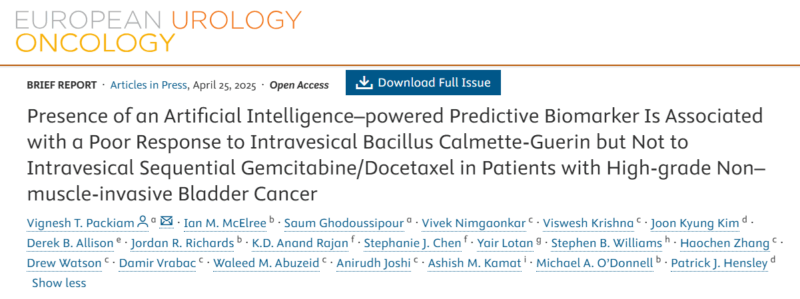Ashish Kamat, Professor and Director of Urologic Oncology Fellowship at MD Anderson Cancer Center, shared a post on X about a paper he co-authored with colleagues published in European Urology Oncology:
“Our recent publication in European Urology Oncology demonstrates – for the first time -that an AI-powered histologic biomarker (CHAI) can predict response to intravesical BCG vs. gemcitabine/docetaxel in high-grade NMIBC. A critical step forward in precision intravesical therapy.
In CHAI+ patients:
- 24-mo high-grade recurrence-free survival (HG-RFS) with BCG: 56%
- HG-RFS with Gem/Doce: 90%
- HR: 5.4, p = 0.007
Significant biomarker-treatment interaction (p = 0.029) confirms predictive – not just prognostic – value. Real implications for first-line choice.
CHAI- patients had no significant difference in HG-RFS between BCG and Gem/Doce (HR 1.3, p = 0.5).
Multivariable models adjusted for AUA/EAU risk further validate CHAI as a treatment-specific predictive marker.
These are the kinds of tools we need to move toward tailored therapy in NMIBC.
The study:
- 253 treatment-naïve patients
- 159 received BCG, 94 Gem/Doce
- CHAI biomarker present in 30%
Pathology analysis was blinded and conducted independently via Valar Labs.
Note: Treatment allocation was based on BCG availability -not patient risk.
This work addresses a practical and pressing problem -BCG shortage – and aligns with a broader need for individualized treatment strategies in NMIBC.
CHAI potentially (still early days) will allow us to identify poor BCG responders and direct them toward effective alternatives.
An important foundation for prospective trials – needs to be validated, of course.
Thrilled to collaborate with outstanding colleagues Vignesh Packiam, Patrick Hensley, Saum Ghodoussipour, Stephen B. Williams, Ian McElree, Yair Lotan and others across institutions.
This is what multidisciplinary, data-driven progress looks like.”
Ashish Kamat and co-authors presented evidence that the CHAI biomarker can predict differential response to intravesical BCG versus gemcitabine/docetaxel in high-grade NMIBC, particularly among CHAI+ patients. The study supports CHAI as a predictive – not merely prognostic – tool and calls for future prospective validation.
Sabine D. Brookman-May, Senior Vice President and Therapeutic Area Head Urologic Oncology at Aura Biosciences, shared this post on X:
“Excellent publication on CHAI AI powered histology biomarker that demonstrated predictive ability for treatment response to BCG in HG.”
Title: Presence of an Artificial Intelligence–powered Predictive Biomarker Is Associated with a Poor Response to Intravesical Bacillus Calmette-Guerin but Not to Intravesical Sequential Gemcitabine/Docetaxel in Patients with High-grade Non–muscle–invasive Bladder Cancer
Authors: Vignesh T. Packiam, Ian M. McElree, Saum Ghodoussipour, Vivek Nimgaonkar, Viswesh Krishna, Joon Kyung Kim, Derek B. Allison, Jordan R. Richards, K.D. Anand Rajan, Stephanie J. Chen, Yair Lotan, Stephen B. Williams, Haochen Zhang, Drew Watson, Damir Vrabac, Waleed M. Abuzeid, Anirudh Joshi, Ashish M. Kamat, Michael A. O’Donnell, Patrick J. Hensley.

Read the Full Article on European Urology Oncology.
More posts featuring Ashish Kamat.


